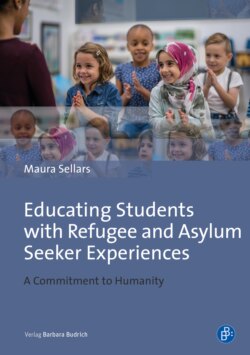Читать книгу Educating Students with Refugee and Asylum Seeker Experiences - Maura Sellars - Страница 9
На сайте Литреса книга снята с продажи.
[1] Chapter One: Power, Politics, People and Pedagogy Introduction
ОглавлениеThe world is currently disrupted by famine, war, violence, and the predatory actions of people against each other. At the time of writing, nearly 66 million people, the largest number in history, are displaced from their homes and urgently in need of assistance from those who are more fortunate. Fifty five percent of these come from just three countries; Syria (5.5 million), Afghanistan (2.5 million) and South Sudan (1.4 million) http://www.unhcr.org/en-au/figures-at-a-glance.html). Almost three million of this number are temporarily placed in Turkey, one and a half million in Pakistan, almost one million in both Lebanon and the Islamic Republic of Iran, and eight hundred thousand in Ethiopia. There are twenty- two and a half million refugees. Over half of this number are under 18 years of age, all of whom have experienced atrocities associated with their refugee status. Refugees are those individuals who must flee their own countries for fear of prosecution as the result of their race, ethnicity, religion, nationality, political opinion, or membership of a specific social group (see http://www.unhcr.org/en-au/figures-at-a-glance.html). Despite their many differences, these individuals have several characteristics in common. These include an overwhelming sense of loss, emotional if not physical trauma and suffering, and the desperate journey to escape the familiar contexts in which they were previously domiciled. The details of these flights vary considerably. The impact on mental, emotional and physical wellbeing is universal, only varying in degree.
Davidson, Murray, and Schweitzer (2008), found that refugee experiences result in poorer general health; poorer mental health including increased somatisation and dissociation; increased levels of psychological distress including susceptibility to posttraumatic stress disorder (PTSD), anxiety and depression; impairments in cognitive function; low perceptions of educational achievement and career aspirations; a lack of family cohesion and reduced feelings of belonging (in Sellars & Murphy, 2017:2).
These statistics, although confrontational, are hardly surprising. Many people are detained in rudimentary camps with few or no amenities, overcrowding and little chance of improving their circumstances independently. Although relief agencies [2] and other groups often attempt to provide some educational experiences for youth, the lack of resources and transitory nature of these sites and their occupants make consistent, skilled support impossible. Education, if it exists for some youth at all, is invariably interrupted. The focus of this writing does not include the difficulties of educational provision for children and adults in such camps as it may be fraught with other contextual complications.
Several countries act as hosts to these camps and detention centres on a temporary basis, whilst other countries agree to accept an agreed quota of individuals in various categories each year. The latter include ‘first world’ countries; democratic, industrialized, capitalist countries which often have similar economic interests (see http://www.nationsonline.org/oneworld/third_world_countries.htm). Less than half of the displaced population is hosted by these countries. Seventeen percent are in Europe, sixteen percent in The Americas and eleven percent in Asia and the Pacific. It is in these locations that young people who are of appropriate age, are most likely to be compelled to participate in mandatory, mass education. Mass education universally is characterised by three core elements;
‘.. is institutionally chartered to be universal, standardized and rationalized….institutionalized at a very general collective level…is institutionally chartered to conduct the socialization of the individual as the central social unit…’ (Boli, Ramirez, & Meyer, 1985: 148-149).
It is these contexts and their students with refugee experiences that are the focus of this work.
